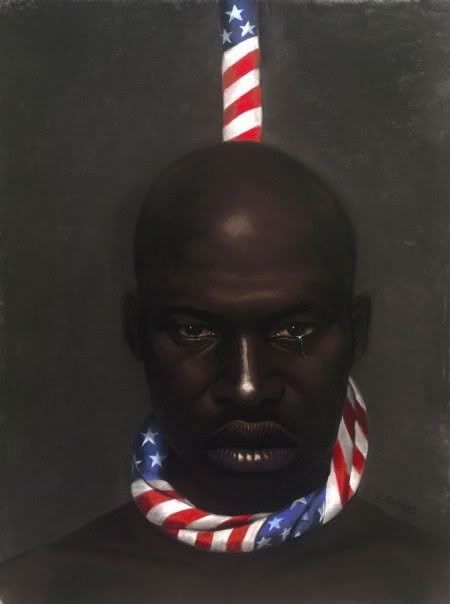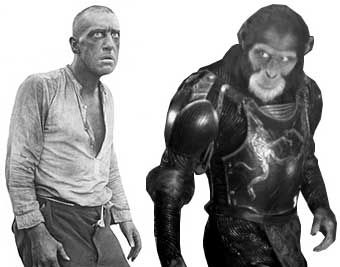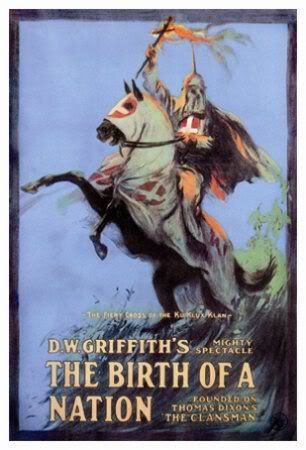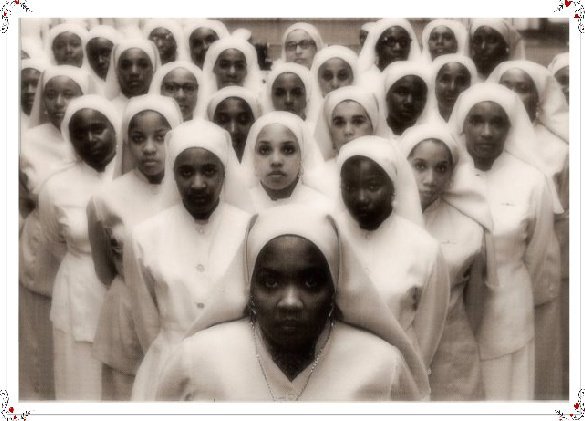
“The mouse is silent while laboring, but when the baby is conceived, she cries.” African Proverb

Shem Hotep ("I go in peace").

Gus (left), played by white actor Walter Long in blackface, represents the threat of the menacing black race, as does Gen. Thade (right), played by white actor Tim Roth in Apeface.

According to D.W. Griffith’s The Birth of a Nation (1915), Abraham Lincoln was wrong. Damn wrong! The propagandistic film, originally entitled The Clansman, presents "the Negro race" as a threat to white society. A subtitle in the film reads:

According to D.W. Griffith’s The Birth of a Nation (1915), Abraham Lincoln was wrong. Damn wrong! The propagandistic film, originally entitled The Clansman, presents "the Negro race" as a threat to white society. A subtitle in the film reads:
"The Ku Klux Klan, the organization that saved the South from the anarchy of black rule."
Although the film doesn’t explicitly vilify President Lincoln (his desire to protect the South after the Civil War is viewed favorably), it nonetheless places the blame squarely on his shoulders for disrupting the tranquillity of white dominance. The film suggests that liberating the black race was not only wrong but dangerous. Blacks, no longer fettered by white mastery, pose a threat to civilization with their lewd, primitive behavior.
The menace of black savagery is best seen when Gus, played by white actor Walter Long in blackface, pursues Flora through the forest. The visual cuts back and forth between Gus, the black aggressor, and Flora, the innocent white victim, not only heightens the film’s drama but arouses feelings of white vulnerability.
In Tim Burton’s Planet of the Apes, this threatening chase through the woods is symbolically continued as a group of white humans flee a pack of terrifying apes. The humans are no match for these athletic simians because, to put it frankly, white men can’t jump.
Thus begins the long awaited update of The Birth of a Nation, a film that the Ku Klux Klan still uses to promote their organization. Whereas Birth of a Nation justifies the oppression of black people in the South, Planet of the Apes reveals the consequences of alleviating such oppression. If we do not control these "savage Negroes," say both of the films, we are going to be a "helpless white minority" running for our lives!
The original Planet of Apes (1968) was an obvious allegory about race and nuclear arms. The underlying message condemned racism by reversing the historical relationship between whites and blacks. Like the current film, white humans were the mistreated slaves, and dark simians were the masters. When the original film was released, the black community was understandably distraught over the ape-African comparison, an insidious racist analogy to begin with. The derogatory association not only deepened stereotypes of the African-American, but increased fears of an eventual "Negro" takeover.
In White Man’s Burden (1995), writer and director Desmond Nakano similarly presents an alternative America where the blacks are powerful and privileged, and the whites are uneducated and unemployed. While Nakano never apes the African-American community, he nevertheless presents a threatening world to racists who are incapable of processing the what-if-it-was-the-other-way-around scenario. Because successful blacks actually do exist, as do struggling whites, the film merely incites their anger. "Damn, look what’s happening to America! The white man is getting screwed. If we don’t do something, the black man is going to take over our whole, fucking planet!"
Burton’s Planet of the Apes fuels this exact kind of racial defensiveness. The connection between the domineering apes and the growing black (and ethnic) culture in America is striking. Almost every human represented in the film is played by a white actor: an insignificant black man ends up getting killed, and a submissive Asian woman is virtually invisible. If humanity is represented as being white in the film, then apeness is understood as being colored. The black man and Asian woman represent minorities that have chosen to blend into whiteness: cultural sell-outs. And, according to the film, they too will suffer under ape domination.
The message of the film is clear: rule the planet. This aggressive tagline, seen in all of the film’s advertising, is a clarion call for white society to regain control of civilization. If white people do not fight back, minorities will endanger white supremacy and threaten white culture. Either white people will rule the planet or the savages will.
But how can whites rule?
In one of the most subversive and misunderstood scenes of the summer, Charlton Heston, the president of the NRA (and the original white captain in the 1968 version of Planet of the Apes), plays the dying father of General Thade, the ruthless chimp on a mission to massacre every human being on the planet. Together for the last time, Thade’s father reveals to his son the secret of the white man’s previous mastery over the simians. He asks Thade to break a mysterious container in his room. When Thade smashes the container on the ground, he uncovers a gun!
In what has been considered a wry, political joke, Heston goes on to condemn the gun as a destructive force capable of wiping out their kind. But this is not an anti-gun stance, as many have claimed. Indeed, it is just the opposite. Heston, as Thade’s father, represents the apes. He is NOT on the side of the white man. Thus the warning that Heston’s simian character gives is, in reality, the key to white superiority. As long as white people have guns, as long as they are the masters of destructive technology, they will rule the planet!
The film’s ending (as well as human history) demonstrates that this is in fact true.
The power shifts on the side of the white man when Leo Davidson (Mark Wahlberg) recovers his gun: only to have it knocked away later by the sympathetic Ari (Helena Bonham Carter). Damn liberal! However, Davidson is able to concoct an even more explosive weapon out of a tank full of gas. When a mob of vicious apes come rushing toward the innocent white community: KABOOM!!!! Fire (a Klan favorite) engulfs the attacking apes. This deadly explosion re-ignites the white community. A battle between the simians and humans ensues. The humans, lacking the necessary weapons, are both outnumbered and outmatched. When, suddenly, from out of the sky, the original space monkey returns!
The fighting immediately ceases, and the apes begin to gather around the landing spacecraft. They believe that the space monkey is their long-awaited Messiah (everyone knows how religious those apes are). But the space monkey turns out to be subservient to Davidson, the white alpha male. Davidson goes on to tell the simian community that their so-called Messiah was a murderer and that their genesis was a travesty. In a time when life was more peaceful, lectures Davidson, the humans were masters over the apes until the apes rebelled and turned all mean and nasty.
Sound familiar?
After Davidson thoroughly demeans everything that the simians have held sacred, the apes are unexplainably apologetic. Instead of hailing Semos a revolutionary for liberating them from a caged life, they humbly decide to live with the white humans in peace. Thade however makes one more attempt to kill Davidson. He seizes the gun, shifting the power once again to the side of the apes, foreshadowing what will happen in the future. Although Davidson is able to outwit him technologically, encapsulating him in a bulletproof casing, it is only a temporary peace. Davidson, who Ari makes clear is the new white Messiah, having replaced the silly monkey myth, heads back home in Christ-like style, ascending majestically into the sky.
Davidson eventually makes it to Earth, where he crash lands in the heart of Washington, D.C., skidding uncontrollably into the Lincoln Memorial. When Davidson gets out, he is shocked to see that the face of Lincoln has been replaced with the face of General Thade! What the hell? When Davidson turns around, the police, the press, and a host of other simians have surrounded him. The damn apes have taken over earth!
Davidson raises his hand in full surrender.
Of course, the ending makes absolutely no sense unless it is understood as a warning to white society. In the end, Lincoln and General Thade are one in the same; they both have contributed to the dominance of the black man in America. Peace is not possible. Who will protect the "helpless white minority"?
"The Ku Klux Klan, the organization that saved the planet from the anarchy of black rule."
Ugh, hide the sheets.














